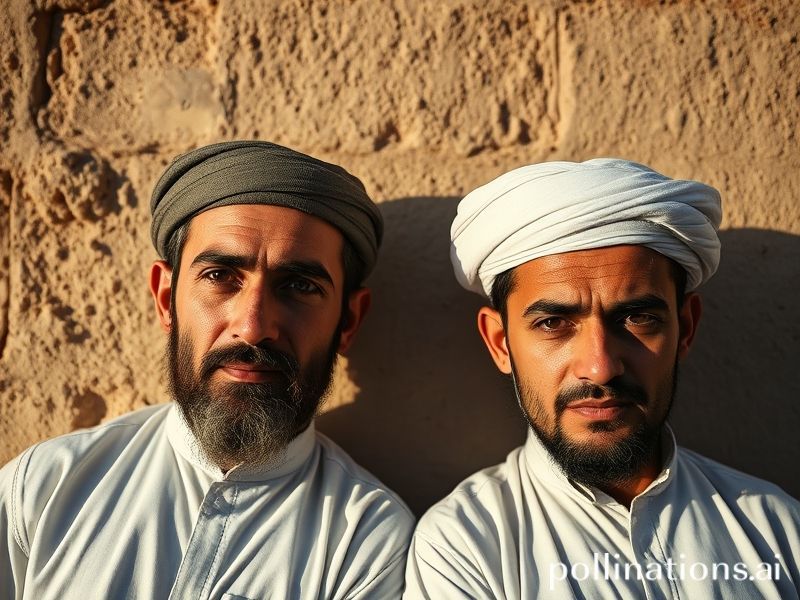Brother of the Taliban’s Travel Agent: How Umer Shah Sells the World’s Riskiest Minerals to the Green Economy
KARACHI—“Brother of the Taliban’s favourite travel agent” is not the sort of résumé line that opens doors in most capitals, yet Umer Shah, younger sibling of the Afghan Interior Minister’s notorious fixer Ahmad Shah, keeps managing to slip through them anyway. While big brother Ahmad busies himself shuttling dignitaries between Kabul, Doha and the occasional five-star safe house, Umer has carved out a quieter, arguably more profitable, niche: translating chaos into consultancy fees for anyone still foolish enough to invest in the region.
From an international vantage, the Shah brothers are a two-man masterclass in geopolitical arbitrage. Sanctions? Merely a pricing adjustment. Diplomatic isolation? A marketing problem. Last month, when the UN squeezed another layer of travel bans onto Taliban honchos, European energy scouts still found Umer lounging in a Dubai co-working space, sipping an oat-milk cortado and peddling “risk-mitigated access” to Afghan lithium. Apparently, the road to the green transition now runs through a man who once traded used Toyota parts for opium futures. How’s that for ESG compliance?
Global appetites, of course, have always been less principled than advertised. Belgium wants rare earths, Qatar needs a back-channel to keep the airport open, and Washington—well, Washington just needs someone to text when the evacuation planes get overcrowded again. Enter Umer, WhatsApping from a premium lounge near Gate B-17, promising “logistics packages” that include everything from landing slots to Taliban-approved catering (halal, obviously, and under ten dollars per MRE). One Western diplomat, speaking on condition of anonymity and a stiff drink, called it “Uber for humanitarian desperation.” The app rating, presumably, is classified.
The joke, if you can still laugh while the planet cooks, is that none of this is new. Empire has always subcontracted its dirty work to bilingual middlemen with flexible ethics. What distinguishes the Shah franchise is the brazen efficiency with which it monetizes the post-American vacuum. Where nineteenth-century adventurers needed gunboats, Umer simply needs an EU passport (thank you, Cyprus investment scheme) and a LinkedIn profile sprinkled with buzzwords: “stakeholder synergy,” “resilient supply webs,” “post-conflict value extraction.” Swipe right, and you too can own a slice of mineral-rich Hindu Kush—terms and sharia-compliant conditions apply.
Broader significance? Look no farther than this week’s commodities desk in London. Cobalt prices are wobbling after Congolese exports hit another militia roadblock, so traders are Googling “alternative lithium Afghanistan” between sips of overpriced flat whites. Algorithms don’t moralize; they just scan for the lowest cost per kilo. Umer’s pitch lands in their inbox like a siren song, promising dirt-cheap ore and “government” assurances—certified, naturally, by his cabinet-level brother. The market’s invisible hand, it turns out, wears a suicide vest.
Analysts insist the arrangement is unsustainable. They said the same about the opium economy, the off-books CIA payrolls, and the Soviet-backed PDPA regime. Meanwhile, Umer is reportedly eyeing expansion: rare-earth brokerage in sanctions-strapped Myanmar, copper facilitation in coup-era Mali, maybe a side hustle in Venezuelan gold—anywhere sovereignty is on clearance. Call it the Axis of Accessibility. Frequent-flyer miles included, blacklisted clientele welcome.
And so the world spins, powered less by ideological blocs than by freelance fixers who remembered to renew their passports. Climate accords? Noble. Green bonds? Adorable. But the raw material for your Tesla’s battery may soon owe its journey to a man whose CV lists “Taliban interfacing” under soft skills. Progress, like water, finds the path of least legitimacy.
In the end, the international order isn’t threatened by Umer Shah; it is exemplified by him. Sanctions regimes, ESG funds, humanitarian exemptions—each layer of bureaucratic sincerity merely creates another arbitrage opportunity for someone with the right brother, the right contacts, and the admirable absence of a conscience. We can clutch our pearls, or we can admit that global governance has become a elaborate shell game played by people who invoice in dollars and settle in favors.
Your move, civilized world—just don’t forget to pay the facilitation fee. Umer prefers wire transfers, but in a pinch he’ll take unmarked dirhams. After all, the climate won’t cool itself.







